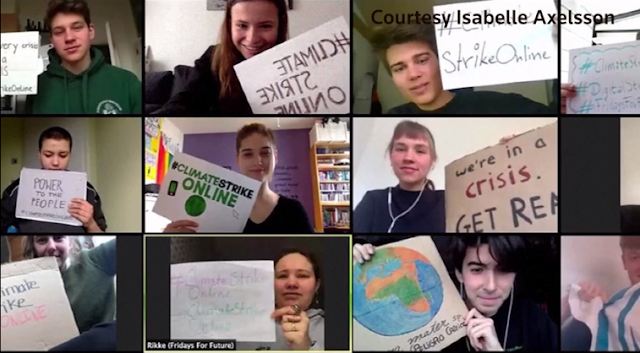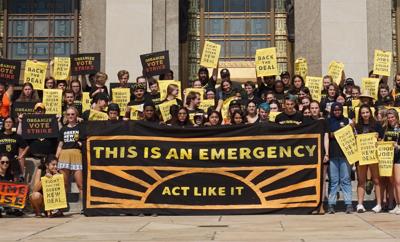COVID-19 and climate change (thoughts, pt. 2)
The co-leader of my school’s strike circle (a team of students organizing our Earth Day climate strike) has to leave the country tomorrow to get back home because he's a European exchange student. This was sudden, and we're all sad we won’t see our friend for a long time. It hit me later that we’re now missing an irreplaceable member of the group, and no one knows what the plan is.
Our vision for Earth Day (April 22) was a student walkout with a rally on the football field and a local march, but now enormous crowds aren’t the way to go. And if the school cancels, it raises the question of what’s the point of striking from online classes.
Thus, I started Spring Break last night with no homework but a long to-do list, trying to pick up the pieces from an exhausting few days. I immediately joined a Sunrise movement webinar about coronavirus, the presidential primaries, and what our actions against climate change might look like going forward.
 |
| Fridays for Future is already online. |
What now, we all wondered. Do we hold an online strike somehow, or in small groups scattered across the city? We’ve worked so hard to get to this point, where the nation is talking about climate change, so how do we build on it while coronavirus captures more attention?
 |
| Greta's right, as always. |
A fellow Sunrise advocate called out how COVID-19 seems to be the biggest emergency of our time even though it mostly threatens older demographics, while climate change has become a “youth issue” and is constantly sidelined. We need to address both! Luckily, last night we brainstormed many alternatives to a traditional climate strike, accommodating public health precautions.
Meanwhile, here’s what every advocate can do:
- Practice self-care.
- First, breathe. Take a spring break, whether you need a day or two or a couple weeks. Physical health is obviously important these days, but so is your mental well-being. Eat a snack, stand up and stretch, take a nap if you need it, and take time to ground yourself.
- Experiment with new ideas.
 |
| Artistic actions? An outdoor strike with small groups standing 15 feet apart? All ideas are good ones. |
- These times are challenging, but also an opportunity to grow. If we can’t gather in mass rallies, this forces us to get creative — something I know my generation excels at. In fact, small group activities can be more empowering, and there’s no limit to the number of groups if you still want a massive scale.
- Connect with others.
- We can’t meet up in big gatherings or offer hugs, but now is no time to be alone. Many people are feeling socially isolated, which makes it especially important to bring others into the movement. If you’re new to advocacy yourself, get involved and bring a friend with you on your journey!
 |
| Sunrise is taking a break from these large-crowd events, but their online trainings and actions are more powerful than ever! |
- https://www.sunrisemovement.org/join The Sunrise Movement holds online welcome calls every week. Join the army of young people to stop climate change and create jobs in the process.
 |
| Concerned about global health? RESULTS is one of the best ways to make a difference. |
- https://results.org/volunteer RESULTS advocates to strengthen health systems in ways that tackle multiple diseases through Gavi, the Vaccine Alliance, and the Global Fund to Fight AIDS, TB, and Malaria. They, too, have online webinars with cool guest contributors each month.
Here’s a video about the “Art Build” my strike circle held on the last school day before Spring Break.
Also, RESULTS has updates and advice on coronavirus here: https://results.org/coronavirus/. Stay safe out there!



Comments
Post a Comment